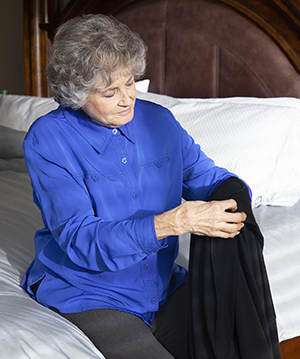Stroke: Self-Care
Routine tasks may be hard after you’ve had a stroke. But many people can learn ways to manage their daily activities. In fact, daily activities may help you to regain muscle strength and bring back function to affected limbs.
Bathing and dressing

By learning a few new ways of doing things, most people who have had a stroke can bathe and dress themselves. You may want to try the following:
-
Test water temperature with a hand or foot that was not affected by the stroke.
-
Use grab bars, a shower seat, a handheld shower, and a long-handled brush.
-
Dress while sitting, starting with the affected side or limb.
-
Put on shirts that pull over the head, and pants or skirts with elastic waistbands.
-
Use zippers with loops attached to them.
-
Visit the hair salon weekly or change to a "wash and wear" hairstyle to stay away from using blow dryers and curling irons.
-
Use an electric shaver instead of a razor to prevent injuries.
-
Review grooming with your occupational therapist.
Managing bladder and bowel problems
After your stroke, you may not be able to control your bladder and bowels. Nurses will work closely with you to set up a new routine.
-
You may be taken to the toilet on a schedule. This might be every 2 to 3 hours. Making a bathroom stop before going out may also work well.
-
A time may be set to empty the bowel. This will help train your bladder and bowels to go at specific intervals.
-
You may wear absorbent briefs or use a condom catheter. This is a small bag that fits over the penis.
-
You can use adult diapers if needed.
-
Drink fluids in the daytime and limit them in the evening so you won't need to use the bathroom at night.
Online Medical Reviewer:
Anne Fetterman RN BSN
Online Medical Reviewer:
Deepak Sudheendra MD
Online Medical Reviewer:
Raymond Kent Turley BSN MSN RN
Date Last Reviewed:
7/1/2022
© 2000-2025 The StayWell Company, LLC. All rights reserved. This information is not intended as a substitute for professional medical care. Always follow your healthcare professional's instructions.